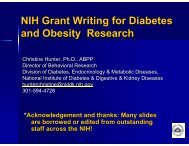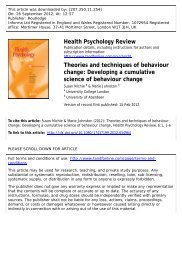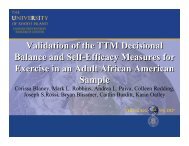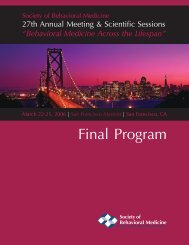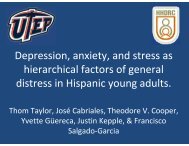Presentation Format Descriptions Rapid Communications Posters ...
Presentation Format Descriptions Rapid Communications Posters ...
Presentation Format Descriptions Rapid Communications Posters ...
Create successful ePaper yourself
Turn your PDF publications into a flip-book with our unique Google optimized e-Paper software.
The 2007 Annual Meeting & Scientific Sessions represents<br />
the 28 th meeting of the Society of Behavioral Medicine (SBM).<br />
The theme for the 2007 meeting is Science to Impact: The<br />
Breadth of Behavioral Medicine. The program tracks have been<br />
designed to encourage presentations that cut across the<br />
dimensions of behavioral medicine.<br />
<strong>Presentation</strong> <strong>Format</strong> <strong>Descriptions</strong><br />
The following are presentation formats at the SBM Annual<br />
Meeting & Scientific Sessions:<br />
PAPERS that cluster around common themes will be selected<br />
for oral presentations of approximately 15 minutes. Members<br />
are encouraged to submit using the “Paper or Poster”<br />
option since all papers submitted under this option that are<br />
not selected for oral presentations will be considered for<br />
poster presentations. Paper submissions judged by the<br />
Program Committee to be especially original and significant<br />
will be selected as Citation Papers.<br />
POSTER PRESENTATIONS allow presenters to discuss their<br />
research with interested colleagues over a period of 75<br />
minutes in an informal setting. Most poster sessions will be<br />
held in conjunction with an evening reception, making them<br />
an excellent opportunity to network with colleagues. Poster<br />
submissions judged by the Program Committee to be especially<br />
original and significant will be selected as Citation<br />
<strong>Posters</strong>.<br />
Please Note: <strong>Posters</strong> are a very important and essential part of the<br />
SBM Annual Meeting. It is also a great way to discuss your work<br />
with colleagues. The Society views posters to be as important as<br />
papers.<br />
SYMPOSIA examine important issues from a variety of<br />
perspectives. Over a period of 90 minutes, alternative<br />
solutions, interpretations, or points of view on a body of<br />
knowledge are presented and debated. Symposia that<br />
include presenters from different disciplines and include<br />
cross-cutting themes relevant to behavioral medicine and<br />
described in the program track descriptions are strongly<br />
encouraged. A symposium typically includes one chairperson,<br />
three presenters, and one discussant. The chairperson<br />
may be one of the three presenters.<br />
SEMINARS are three-hour presentations by 1-3 speakers<br />
which emphasize the theory and application of practical<br />
skills.<br />
<strong>Rapid</strong> <strong>Communications</strong> <strong>Posters</strong><br />
<strong>Rapid</strong> <strong>Communications</strong> <strong>Posters</strong> offer a forum for the very<br />
latest findings in behavioral medicine. All <strong>Rapid</strong> <strong>Communications</strong><br />
<strong>Posters</strong> must be electronically submitted and received<br />
by 11:59 pm Eastern Time on January 4, 2007. Submission<br />
information for <strong>Rapid</strong> <strong>Communications</strong> <strong>Posters</strong> will be<br />
available on the SBM website (www.sbm.org) at 11:59 am<br />
Eastern Time on December 5, 2006. The Program Committee<br />
will review submissions for posters only.<br />
Topics<br />
Each corresponding author will be asked to select one of the<br />
following topics which best describes their abstract submission.<br />
Topics represent the program tracks. Abstracts will be<br />
blinded and reviewed by experts in each of the areas.<br />
· Adherence<br />
· Behavioral Medicine in Medical Settings<br />
· Biological Mechanisms in Health and Behavior Change<br />
· Complementary and Alternative Medicine<br />
· Diversity Issues<br />
· Environmental and Contextual Factors in Health and<br />
Behavior Change<br />
· Health Communication and Technology<br />
· Lifespan<br />
· Measurement and Methods<br />
· Population Health, Policy and Advocacy<br />
· Prevention<br />
· Psychological and Person Factors in Health and Behavior<br />
Change<br />
· Quality of Life<br />
· Spirituality<br />
· Translation of Research to Practice
Descripti<br />
iption on of Tracks<br />
Adherence<br />
Adherence has been described as a patient’s tendency to<br />
follow medical recommendations. Non-adherence can lead<br />
to unnecessary disease complications, disease progression<br />
(including premature death), reduced functional abilities<br />
and quality of life, as well as substantial costs to the health<br />
care system. This track seeks abstracts that address etiologic<br />
factors (person, environmental, contextual) of non-adherence,<br />
measurement and methodological issues related to<br />
adherence, interventions designed to prevent or to remediate<br />
adherence problems, and examinations of theoretical models<br />
of adherence.<br />
Behavioral Medicine in Medical Settings<br />
Recent changes in medical practice have placed greater<br />
emphasis on primary health care. In order to have optimal<br />
impact in the changing health care system, behavioral health<br />
professionals must function effectively in this context.<br />
Abstracts that address psychological disorders as they arise<br />
in a medical setting and behavioral treatments for chronic<br />
illness are appropriate for this track. Specifically, this track<br />
welcomes abstracts with a focus on assessment and treatment<br />
of co-morbid psychiatric and medical conditions;<br />
consultation and collaboration with physicians; and cultural<br />
and ethical-legal concerns related to practicing in<br />
medical settings.<br />
Biological Mechanisms in Health and Behavior Change<br />
This track seeks abstracts that have a primary focus on biobehavioral<br />
mechanisms and/or physiological risk factors of<br />
illness and disease. Investigations of the clinical and/or<br />
biological changes associated with these factors are encouraged.<br />
Specifically, this track encourages submissions in the<br />
areas of psychoneuroimmunology (PNI), psychophysiology<br />
(e.g., cardiovascular reactivity), and<br />
psychoneuroendocrinology.<br />
Complementary and Alternative Medicine<br />
Abstracts that address mechanisms of health and illness and<br />
interventions that generally are outside conventional<br />
Western medical/psychological approaches should be<br />
submitted to the Complementary and Alternative Medicine<br />
track. Interventions might include, but are not limited to,<br />
acupuncture, meditation, art therapy, Qi Gong, botanicals,<br />
special diets, or therapeutic touch. Abstracts that involve<br />
spirituality should be submitted to the Spirituality track.<br />
Diversity Issues<br />
Abstracts that illustrate the impact of culture, race, ethnicity,<br />
socioeconomic status, gender, sexuality, and other social<br />
factors on health and illness should be submitted to the<br />
Diversity Issues Track. Investigations of proposed determinants<br />
and biological mechanisms of health and illness, as<br />
well as studies describing novel approaches to prevention<br />
and intervention are relevant to this track. Studies that<br />
describe innovative approaches to the study of disparities at<br />
the individual or population level are of particular interest.<br />
Environmental and Contextual Factors in Health and<br />
Behavior Change<br />
This track seeks abstracts that address the relations between<br />
health and the environment. Abstracts may address the<br />
contexts in which psychosocial and behavioral interventions<br />
are delivered (e.g., family, workplace, schools, communitybased<br />
agencies, health systems); the synergistic ways in<br />
which interpersonal, sociocultural, physical, environmental,<br />
and systems factors affect health and well being; political,<br />
economic, and environmental determinants of health; and<br />
social and environmental factors implicated in the etiology,<br />
prevention, and treatment of a broad spectrum of health<br />
behaviors and illnesses.<br />
Health Communication and Technology<br />
This track seeks abstracts that focus on the impact of information<br />
and communication technology on health behavior<br />
outcomes and processes. Abstracts that address the use of<br />
print, phone, computer, Internet, and personal digital<br />
assistants (PDA) are appropriate for this track. Studies may<br />
address the use of these technologies by patients and health<br />
care providers, as well as the design, implementation, and<br />
evaluation of behavior change interventions delivered<br />
through advanced technologies.<br />
Lifespan<br />
Abstracts describing relevant research and clinical programs<br />
that focus on behavior change across or at specific periods or<br />
phases of the lifespan should be submitted to the Lifespan<br />
Track. This track is interested in abstracts that explore the<br />
ways in which individuals learn and practice healthpromoting<br />
activities during specific time periods from cradle<br />
to grave, and the facilitation of healthy lifestyles over time.<br />
Abstracts that focus on illness and related behaviors at<br />
specific developmental timepoints or over time would also be<br />
appropriate for this track. Two types of abstracts should be<br />
submitted to this track: 1) submissions with a focus on a<br />
particular age group that address factors relevant to health,<br />
illness, or behavior specific to that age group; or 2) submissions<br />
with a focus on health and behavior over time, or<br />
across age- or developmental- periods.
Measurement and Methods<br />
Abstracts that focus on measurement or methodological<br />
issues related to behavioral medicine topics should be<br />
submitted to the Measurement and Methods Track. Relevant<br />
to this track are submissions that involve scale development,<br />
application of measurement techniques, or statistical approaches<br />
and applications. The focus of submissions to this<br />
track should be on the measurement issues or methodological<br />
techniques.<br />
Population Health, Policy and Advocacy<br />
Abstracts that focus on health and behavior of large segments<br />
of the population should be submitted to the Population<br />
Health, Policy and Advocacy Track. Studies or programs<br />
whose results would apply to a significant percentage of the<br />
population are appropriate for this track. The application of<br />
the results to large segments of the population is a more<br />
relevant factor in submitting to this track than is the size of<br />
the study’s participant pool. In particular, abstracts that<br />
include policy implications, that involve behavioral medicine<br />
in the political process, or that report outcomes at the<br />
population level (e.g., cost-effectiveness) are appropriate for<br />
this track. Finally, approaches and programs that involve all<br />
levels of advocacy are of particular interest to this track.<br />
Prevention<br />
Abstracts submitted to the Prevention Track should provide<br />
data from research that targets primary or secondary prevention<br />
health behaviors. Examples include, but are not limited<br />
to, assessment and/or intervention studies of health promoting/risk<br />
reducing behaviors (e.g., “healthy” eating behaviors,<br />
sunsafe behaviors, smoking prevention, etc.) as well as<br />
of screening/early detection behaviors (e.g., adherence with<br />
self- or professionally delivered screening recommendations,<br />
etc.)<br />
Psychological and Person Factors in Health and<br />
Behavior Change<br />
Abstracts submitted to this track should focus on the relationship<br />
between psychological factors and health, health<br />
behaviors, and behavior change. Psychological and person<br />
factors may include motivation, emotion, cognition, learning,<br />
risk perception, information processing, personality, and<br />
coping. Abstracts that address these factors in a particular<br />
age group (e.g., children, older adults) or across age- or<br />
developmental- periods should be submitted to the Lifespan<br />
Track. Likewise, studies whose results may apply to a large<br />
segment of the population should be submitted to the<br />
Population Health, Policy and Advocacy Track.<br />
Quality of Life<br />
Quality of life has been defined as the degree to which the<br />
expected physical, emotional, and/or social well-being of an<br />
individual is impacted by treatment for a medical condition<br />
or the condition itself. Abstracts describing research on<br />
quality of life should be submitted under this heading.<br />
Submissions may include documentation of quality of life in<br />
persons with various medical conditions, interventions to<br />
improve quality of life, and predictors of quality of life (e.g.,<br />
psychosocial, contextual, environmental.)<br />
Spirituality<br />
Abstracts that describe spiritually- or religiously-oriented<br />
processes, mechanisms, or interventions related to health<br />
and illness should be submitted to this track.<br />
Translation of Research to Practice<br />
Submissions to this track should describe quantitative and/<br />
or qualitative studies that focus on the mechanisms underlying<br />
the successful dissemination of research findings into<br />
‘real-world’ practice. Although not a comprehensive list,<br />
data from demonstration, feasibility, effectiveness, and<br />
participatory studies would be highly suited for this track.<br />
Also appropriate for this track are abstracts that examine the<br />
reach and effectiveness of health behavior interventions, as<br />
well as setting level variables that may inhibit or facilitate<br />
delivery.<br />
Electronic Abstract Submission Process<br />
The Society of Behavioral Medicine (SBM) will be accepting<br />
abstract submissions for the 28 th Annual Meeting & Scientific<br />
Sessions through the Call for Abstracts. All abstract<br />
submissions to the Society of Behavioral Medicine are peer<br />
reviewed and may be accepted for either an oral presentation<br />
or a poster presentation. All accepted abstracts are published<br />
in the Annual Meeting Supplement of the Annals of<br />
Behavioral Medicine. The supplement serves as the official<br />
abstract book for the SBM 28 th Annual Meeting. All abstracts<br />
must be submitted electronically no later than 11:59 pm<br />
Eastern Time on Wednesday, September 13, 2006. Instructions<br />
and an online submission system will be available on<br />
the SBM website on July 19, 2006.<br />
Abstracts must conform exactly to the instructions provided for<br />
electronic submission (found at www.sbm.org). Abstracts must<br />
be submitted in English and all presentations will be in English.
Official Abstract Submission Site for the SBM<br />
28 th Annual Meeting and Scientific Sessions<br />
Abstracts are accepted only at the official SBM 28 th Annual<br />
Meeting abstract submission site, by accessing<br />
www.sbm.org. This is the ONLY option for abstract submission.<br />
This allows you to prepare and submit your abstract<br />
interactively on the Internet.<br />
Simply access www.sbm.org and navigate to the annual<br />
meetings page from the main menu. Once the page is loaded,<br />
click on the abstract submission link. When an abstract is<br />
submitted, it is forwarded directly to ScholarOne. ScholarOne<br />
is the abstract processing company of the Society of Behavioral<br />
Medicine. ScholarOne will process the abstracts and<br />
send a confirmation by email within two business days of<br />
submitting your abstract.<br />
Abstracts accepted for oral or poster presentations will be<br />
acknowledged by December 1, 2006. If you DO NOT receive<br />
notification regarding your abstract, please send an email<br />
inquiry to acsupport@scholarone.com. Your email will<br />
receive a prompt answer. Inquiries before December 1, 2006<br />
will not receive a response. Note: All presenters are expected<br />
to pay for their own travel, lodging, and registration fees.<br />
Please follow the steps below when submitting an abstract:<br />
1. Access the abstract submission website, www.sbm.org.<br />
2. Complete abstract submission.<br />
3. You will receive confirmation within two business days<br />
of completing the abstract process.<br />
4. Notification for oral or poster presentations will be<br />
acknowledged by December 1, 2006.<br />
Important Guidelines<br />
· All presenters of accepted abstracts must pre-register for<br />
the SBM Annual Meeting.<br />
· Each presenting author is responsible for his/her own<br />
registration fee.<br />
· Authors are limited to three (3) Presenter abstract submissions.<br />
· Presenters who are unable to attend the Annual Meeting<br />
should arrange for another person to present their paper/<br />
poster, and should notify David Wood dwood@sbm.org at<br />
SBM as early as possible of this change. Persons who<br />
withdraw a presentation will be denied access to submitting<br />
abstracts for the 2008 Annual Meeting. The only<br />
exceptions to this policy are weather- or illness-related<br />
situations.<br />
Prior Publication<br />
Papers that have been published or presented elsewhere<br />
prior to the time of presentation may not be submitted.<br />
Very y Important - Please e Note<br />
Each abstract submitted should represent complete and<br />
original results. Submitting multiple abstracts in which the<br />
same data are analyzed in different ways, or in which a<br />
study is subdivided into small pieces, is prohibited and will<br />
result in abstracts being rejected, and may result in individuals<br />
being prohibited from submitting abstracts for future<br />
meetings. If you have any questions about abstract content,<br />
please contact David Wood at dwood@sbm.org<br />
SBM 28 th Annual Meeting<br />
Registration/Accommodations<br />
Registration forms and hotel and airline information will be<br />
mailed to both SBM members and abstract authors in January<br />
2007. For additional information, visit the SBM website at<br />
www.sbm.org or contact the SBM executive office at:<br />
555 East Wells Street, Suite 1100<br />
Milwaukee, WI 53202<br />
Phone: 414-918-3156<br />
Fax: 414-276-3349<br />
Email: dwood@sbm.org<br />
Important Dates and Deadlines<br />
September 13, 2006<br />
Abstract Submission Deadline<br />
November 1, 2006<br />
Online Housing Reservations Site Opens<br />
November 17, 2006<br />
Abstract Acceptance Letters Distributed<br />
December 1, 2006<br />
Online Early-Bird Registration Begins<br />
December 5, 2006<br />
<strong>Rapid</strong> <strong>Communications</strong> Submission Site Opens<br />
January 4, 2007<br />
<strong>Rapid</strong> <strong>Communications</strong> Submission Deadline<br />
February 5, 2007<br />
<strong>Rapid</strong> <strong>Communications</strong> Acceptance Letters Distributed<br />
February 21, 2007<br />
Early-Bird Registration Deadline<br />
February 21, 2007<br />
Housing Reservations Deadline<br />
98-0606-003




